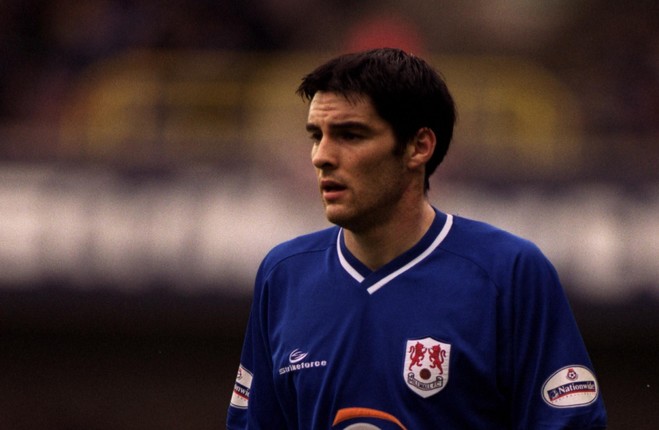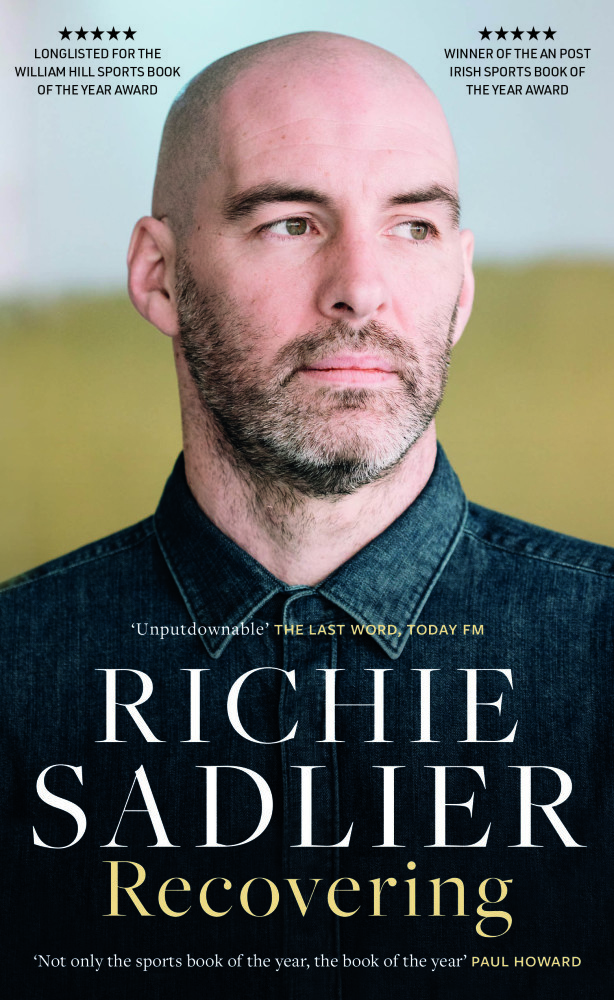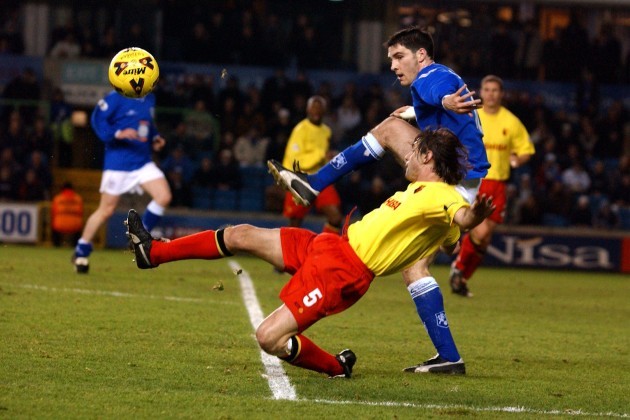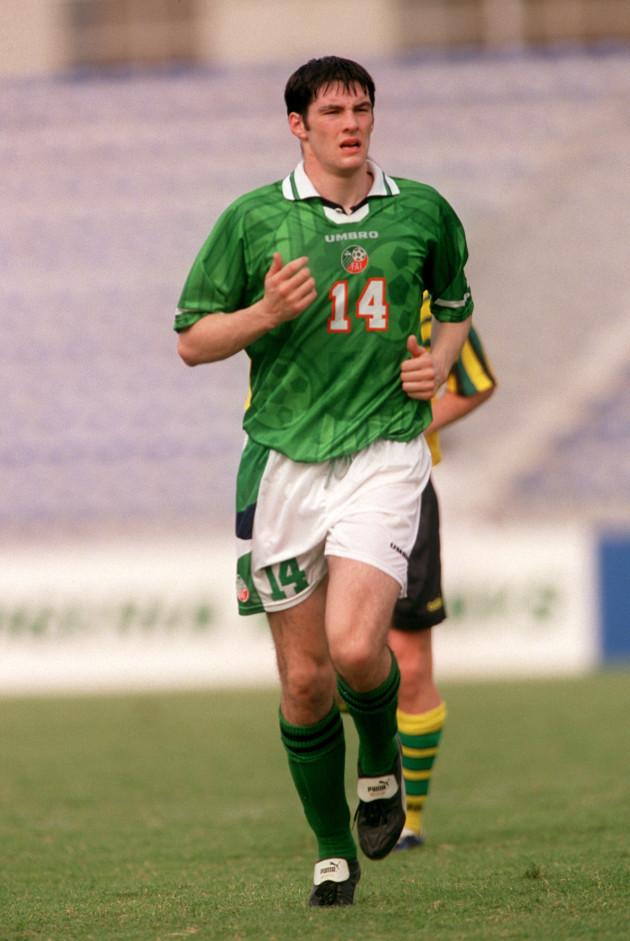THE FOLLOWING PASSAGE is an extract from ‘Recovering’ by Richie Sadlier.
My house became known as ‘The House of Sin’. But it was also a home from home for anyone over from Dublin. Robbie Ryan, Millwall’s left-back, moved in with me. Robbie was two years older than me and grew up in Ballybrack. He loved telling non-Irish people he was from Dalkey and that Bono was his neighbour. We roomed together for away matches and went on holidays together in the summer. We were inseparable back then, and my family and mates from Dublin all loved him.
Like me, Robbie was full of self-doubt. But while I kept my insecurities as hidden as possible, he told anyone who would listen about his own. He could never see what others saw in him, and convinced himself that various managers, the fans or the chairmen didn’t rate him. I could see how self-defeating it was to be so self-critical, but the ability to observe the pointlessness of it in others didn’t stop me doing the same thing.
We turned the house into an exile’s cliché. A huge tricolour hung on the sitting-room wall, the soundtrack was usually Irish music of some kind and a framed Proclamation of the Republic was pinned up at one stage. On Saturday nights, it was a party house. There would be Belgian, Australian and British teammates belting out ‘Ooh ah, up the Ra’ without any knowledge of what they were actually singing. It wasn’t that any of us
supported the IRA, but the songs were Irish and catchy, so that was enough.
I was living a life that seemed impossible to my friends. I had money, free time and a great job that came with lots of perks. If one of my mates from Dublin couldn’t come over because he was broke, I would pay for his flight on the condition he didn’t tell any of the other lads. I never had to pull out of something because I couldn’t afford it. I had no expensive habits, I didn’t gamble and nobody ever went bankrupt buying their clothes in JD Sports. My biggest outlay was on DVDs.
My mate Johnny was a regular visitor. During one trip, he jumped naked out of the upstairs window to pay for our pizza. He landed on the lawn, did a couple of awkward tumbles and then breezily jumped to his feet to pay for the food. He just shook your man’s hand afterwards and walked back into the house.
I wasn’t in Kansas any more, and I tended to connect with people who were finding their way too. While my friends from Dublin were always over, soon there were others who would become just as important, and eventually nobody became more important to me than Hicksy.
Mark Hicks arrived at Millwall a couple of years after me and he was younger, funnier and more talented. Those factors could have been massive hurdles to our friendship but once we got to know each other, they didn’t matter at all. For the next ten years, a day didn’t go by when I didn’t talk to Hicksy. The person I drunkenly shared my secrets with? Hicksy. The person I asked to accompany me when my career was on the line? Hicksy? The person I asked to fly to America with me when I was making a comeback? Hicksy.
Hicksy was different and he knew it. He was from Belfast and had made news as a kid when he turned down an approach from the Irish Football Association to play for Northern Ireland. He was from the Falls Road and, to him, there wasn’t even a choice. That didn’t matter to the clubs who wanted him. He could have gone to Leeds or Celtic. Unlike me, he had options, but he chose Millwall. I was always grateful that he did.
At Millwall, there was something about his manner that encouraged coaches to go hard on him. Maybe it was because he always gave the impression he didn’t give a shit, but he was always picking up fines. He was fined for eating a sandwich once. Another time, he was fined two weeks’ wages for going bowling the night before a reserve game. He was regularly called a pisshead, solely because he was Irish. Yet when he was recovering from an operation, a member of the coaching staff visited him in hospital and brought him eight cans of lager, just to tide him over. I wanted him on my side and he always was.
—
I was a professional footballer and people were relying on me. Millwall supporters demand a lot from the players, but a lot of the time I could forget about that. A lot of the time I was a teenager, doing what a teenager does.
I did a questionnaire for a Millwall fanzine when I was nineteen. They asked what song I would like to walk onto the pitch to. I went for
‘Teddy Bear’s Head’ by the Wolfe Tones, a rebel song about getting the English out of Ireland by force. ‘What’s your lifetime ambition?’ they asked. My answer? ‘To shag Toni Braxton.’ This was pre-Twitter, thankfully, so I wasn’t shamed all over the internet and branded a misogynistic, nationalist thug for life. Back then teenagers could get away with being teenagers who said dumb things.
I was also a teenager with nobody supervising me. All my friends in Dublin lived with their parents while I owned my own home. Three mates from home – Ed, Ste and Sketts – moved in with me and found work in a local travel agency. There were no grown-ups in our world and I certainly wasn’t one. I was Tom Hanks in Big – suddenly catapulted into an adult body but with interests that were still primarily juvenile. Everyone would share in my good fortune, especially if the good fortune involved the lads filling condoms with water and hanging them on the bushes outside the house, where I’d see them when I came home from training.
In the outside world, people would ask me questions about football and expect a profound answer. There was nobody waiting to hear what I had to say about who would win the Premier League when I was with the lads and that was what I wanted. Nobody was hanging on my every word. If they asked me a question, it was so they could take the piss out of my answer. I was the butt of all their jokes and that’s where I wanted to be. Don’t get serious, don’t look to me for answers. Fuck that, let’s get the lads over and throw darts at each other’s bare chests. That will pass the time.
In most senses, my social life was ordinary. Looking back, what’s extraordinary is not how wild we were, but how well behaved we were. I had few responsibilities and, most of the time, I did little that would cause alarm. I would spend afternoons watching episodes of Friends and arguing with Robbie over who would cook the dinner.
There were other benefits, of course. I had arrived at Millwall as a virgin, incapable of approaching girls. I never quite learned how to approach girls, but that didn’t matter if you were a professional footballer. I was in a different world from my mates back home. We all grew up believing lads were the ones who made the first move, but in London girls would approach us every time we went out.
The Millwall lads would call me ‘Paddy-at-the-bar’ when we went out. I wasn’t one for dancing or jumping on tables or doing anything that attracted attention. I’d just sit on a barstool and the conversation would take place around me. While others might be trying it on with girls, I would happily spend the night chatting to whoever happened to sit next to me. The opportunities for casual hook-ups were so common that if you didn’t make a conscious decision to go home alone, you probably wouldn’t.
This didn’t concern me then; the opposite, in fact. I was having fun and nights out were an extension of the juvenile world I was living in. Later, when I grew cynical about relationships, believing they were always doomed, I wondered how much of these ideas were formed during those years.
Behaviour that might be considered alarming was tolerated and joked about. To some lads in the dressing room, sleeping with someone other than your partner was talked about as matter-of-factly as where you might go on a Friday night. There was no fuss, no sense of obligation. The only people you owed anything to were your teammates. That was what we were told to believe and, because it suited many of us in this situation, we believed it.
I remember mentioning to one of the academy staff that one Irish lad was having problems settling. He immediately came up with a solution: ‘Not being funny, but why don’t you all chip in and get him a brass?’ I was young, naïve and stupid, but I still didn’t think that getting the young and bewildered player a prostitute was the best idea.
The dressing room was a strange place. There were teenagers mixing with men in their thirties. By the time you’re 27, you’re expected to have a maturity – at least on the football pitch – that you wouldn’t expect from someone of that age in any other walk of life.
Within the dressing room everything is accelerated, but outside it you can easily remain the adolescent who first walked in. There were other elements which made it a little different, too. It wasn’t unusual for two or three lads to be knowingly sleeping with the same woman. If she spent one night with me, she might spend another with a teammate. Sometimes there might be more than two consenting adults involved, which I had never even heard of in Dublin.
My life was fun and this all seemed harmless. Nightclub bouncers would usher us past queues, straight into VIP areas. When I left Dublin, I had never even seen a VIP area, let alone been in one. I would take the favours when they were handed out, but I would never go up to bouncers and tell them I was a Millwall player, even when mates would ask me to.
I didn’t venture into London much so I went to the same pubs, the same clubs, with the same mates all the time. And then I slept with the
same girls.
If you’d asked me if being a professional footballer had changed me, I’d have argued that it hadn’t. The world around me had altered and the way the world responded to me had altered too, which was the most important change of all. I was still the same bloke, but everyone treated me differently.
Of course, I was changing; I can see that now. I became more guarded around people, less trusting of their motives. And when it came to relationships with women, I kept them all at arm’s length. I wasn’t particularly sure why I was doing it, but I knew I was. Empty, emotionless one-night stands were on offer and they suited me because nobody would ever want to get close. I had always tried to fit in. I was hyper-sensitive about not making a fuss, so I wouldn’t make any demands. But if the world wanted to treat me differently, I was going to go along with that too. It was what I’d always done and I wasn’t going to change now, when going along with things was so much fun. It quickly became routine to me. It was only when friends from Dublin came over and pointed out how different it was that I’d take notice, but only briefly.
But even then there were times when my own behaviour shocked me. These moments couldn’t be laughed off so readily. I would get a glimpse of another person and wonder if that was really me. Inevitably, this would happen when there was drink involved. I was beginning to discover I blacked out very easily. Nobody could tell because I’d be talking away as normal. I could be having a chat about anything, about the big issues of the day or the latest episode of Friends and you’d think I was making sense, but the next day I wouldn’t remember a word of it.
I could wake up in bed beside a girl with no memory of anything that had happened. In that drunken haze of the morning after, we would often try to piece it together and laugh about how little I recalled. One night I was talking to a girl in a bar. She was very friendly so we were chatting away and, as I was ordering a drink, I asked her if she wanted one too.
‘Sorry, I didn’t introduce myself, Richie’s my name.’ I leaned over to shake her hand. She didn’t take it.
‘You’re fucking joking me,’ she said.
‘What do you mean?’ ‘We met last week.’
‘Ah, I’m sorry. Here listen, my memory goes when I’m drinking. This happens all the time. Really sorry.’
‘You don’t remember?’
‘No,’ I said, still quite breezy about the whole thing.
‘We went back to your house.’
‘Ah, right ’ I said, but still nothing registered. Lots of people came back to my house, nothing unusual in that.
‘We had sex.’
My breeziness disappeared. My heart raced. I had never seen her before. I had no memory of any of this. Fuck. Fuck. Fuck. She looked at me with contempt and walked away without saying another word. My mates confirmed the girl was telling the truth. They remembered meeting her and said she was lovely. My mates found it all hilarious. ‘Jesus, Sads, what are you like?’
It was becoming a running joke that I forgot everything. But in the minutes between her telling me we’d had sex and me joining in the joke with the lads, I had a moment of realisation that scared me. It wasn’t profound and it wasn’t anything that was going to make me reconsider my attitude to drink or sex, but I didn’t like it. That was all I knew.
I didn’t like myself if this was the sort of thing that happened when I was in blackout. I felt like a complete prick, even though I also felt that anything that happened was out of my control. Again, I was passive, a spectator trying to piece together the events in my own life. But that didn’t really matter. You are what you do, defined by how you act. To the girl I’d slept with the week before, I was the person who had done this. I
was the prick.
After a while, though, nearly everything could be laughed off. One Sunday morning before training, the manager asked one of the senior pros what his plans were for that day.
‘Think I’m off to the missus’s parents’ house for a barbecue,’ he said. ‘I wouldn’t if I were you, mate,’ the manager said in a fit of laughter.
‘Check out page seven in the News of the World.’
A woman had given an interview claiming she had slept with a different footballer from each of the top four divisions. Our teammate was representing the second division.
We knew all the pitfalls and we laughed them all off. A wife could catch her husband cheating on her – a serious event in the real world but a source of great amusement in our dressing room at the time. I didn’t want that kind of marriage, but at that time I didn’t want any kind of marriage and the more I learned of life – life viewed through this prism – the more certain I was that I never would. Relationships were all doomed anyway, so marriage was pointless.
I was lucky that my friends from home were always around to keep me grounded, even if their methods of keeping me there were sometimes unwelcome. They were the one constant through every up and down I’d had since I was twelve. You’re never sure who’s really your mate when you become a professional footballer, but in a world of hangers-on, spoofers and spivs, the closest I came to being myself was when I was with them.
I was deep in conversation with my mate Burkey in a kebab shop one Saturday night. We were having one of those philosophical chats you have over a kebab when next thing he leaned back, swung and punched me in the face.
‘What the fuck!? What was that for?’
‘That’s just to make sure you keep your feet on the ground,’ he explained, as if I was the fool for not understanding what was happening.
‘Are you serious? You couldn’t have just—’
BANG! He hit me again, mid-sentence. Same fist, same side of the face, but a little harder. There was more behind this one.
‘Are you for fucking real? What was that for?’
‘You need to toughen up. You keep getting injured. That’s so you won’t get injured again.’
Despite the occasional punch in the face, the lifestyle was easy to love. I’d train during the day, go home and spend an afternoon playing snooker. Even the serious stuff was what others did for fun – play a game of football. I had no children and was single the majority of the time, if that really mattered. My only responsibility was to turn up for training on time and keep myself fit.
—
When real life did intervene, my method of dealing with it was simple: stay quiet as long as you can and hope the problem would be taken care of.
‘Don’t you know why I’m here?’ she asked.
I had no idea, as she had never called to me on a Sunday morning before, but I knew there must be a reason for the unannounced visit. Thankfully, I wasn’t hungover as we had a game on Tuesday.
‘No,’ I said. ‘Come on in. What’s up?’
‘You’ve no idea? Really?’
We had been hanging out in the same group for a few months. Her mates and my mates regularly ended up at the same parties, which were usually in my house on Saturday nights.
‘No, go on,’ I said, but something was starting to register. I remembered being in my bedroom with her the previous month but I couldn’t remember the specifics. I knew my memory wasn’t a reliable source for my weekend behaviour. If I wanted to know my exact movements on a night out, I had to rely on the accounts of whoever happened to be in my company. Then it came.
‘I’m pregnant.’
‘Jesus. Really?’
I’m not sure what I said after that. She didn’t want to stay long as she had a friend sitting outside in the car. She told me she wasn’t sure what reception she would get so she wanted the moral support. I was a little insulted that she thought I would react badly, but I understood. These aren’t situations anyone prepares you for.
We agreed that she would call back on Wednesday night to discuss it properly. My old Belvedere manager Gerry and his wife were staying with me for the weekend and were due to return any minute. I was keen to avoid any questions from them so I was happy to postpone the conversation.
I didn’t really know what to do. Who could I tell? How could I explain it? Even though I was used to it by now, I was embarrassed that I couldn’t recall my own behaviour on a night out. Jesus, I was going to be a father and I didn’t even know the woman’s surname.
I had no trouble concealing my emotions when Gerry and his wife returned. That bit was easy, as not showing my feelings was my specialist subject. I didn’t mention it to them or anyone else and stored it away in the part of my mind I’d wilfully ignore. I’d had years of practice at that.
The following evening, the phone rang. It was the friend who had waited outside.
‘She’s in hospital, they think she’s having a miscarriage.’
‘Jesus. Eh, thanks for letting me know. Is there anything I can do?’
‘Not really.’
A couple of hours later, she rang again to confirm it.
She called over as planned a couple of nights later. I was on crutches, having badly injured my ankle in the game on Tuesday. We spoke about it all for about three hours, with neither of us really knowing what to say.
We didn’t try to romanticise our relationship or catastrophise the miscarriage. We were both a little in shock, realising that our drunken antics could have made us parents, and both relieved that we were looking back on a miscarriage rather than ahead to parenthood.
We both said that if the miscarriage hadn’t happened we would have fumbled our way into being parents and done our best. We wondered what kind of job we would have done bringing up a child together. But, like a lot of young people who find themselves in a situation like this, we both saw it as a bullet we had successfully dodged.
It’s easy to be hard on myself looking back, but I tried to handle this as best I could. By this stage, there was an element of chaos taking hold in my life. It was an unplanned pregnancy that time, but there was always something. All week I would be a good pro. On Saturday nights, though, anything could happen. And it was always when I drank.
Recovering by Richie Sadlier, with Dion Fanning is published by Gill Books. More info here.
Originally published at 07.30




